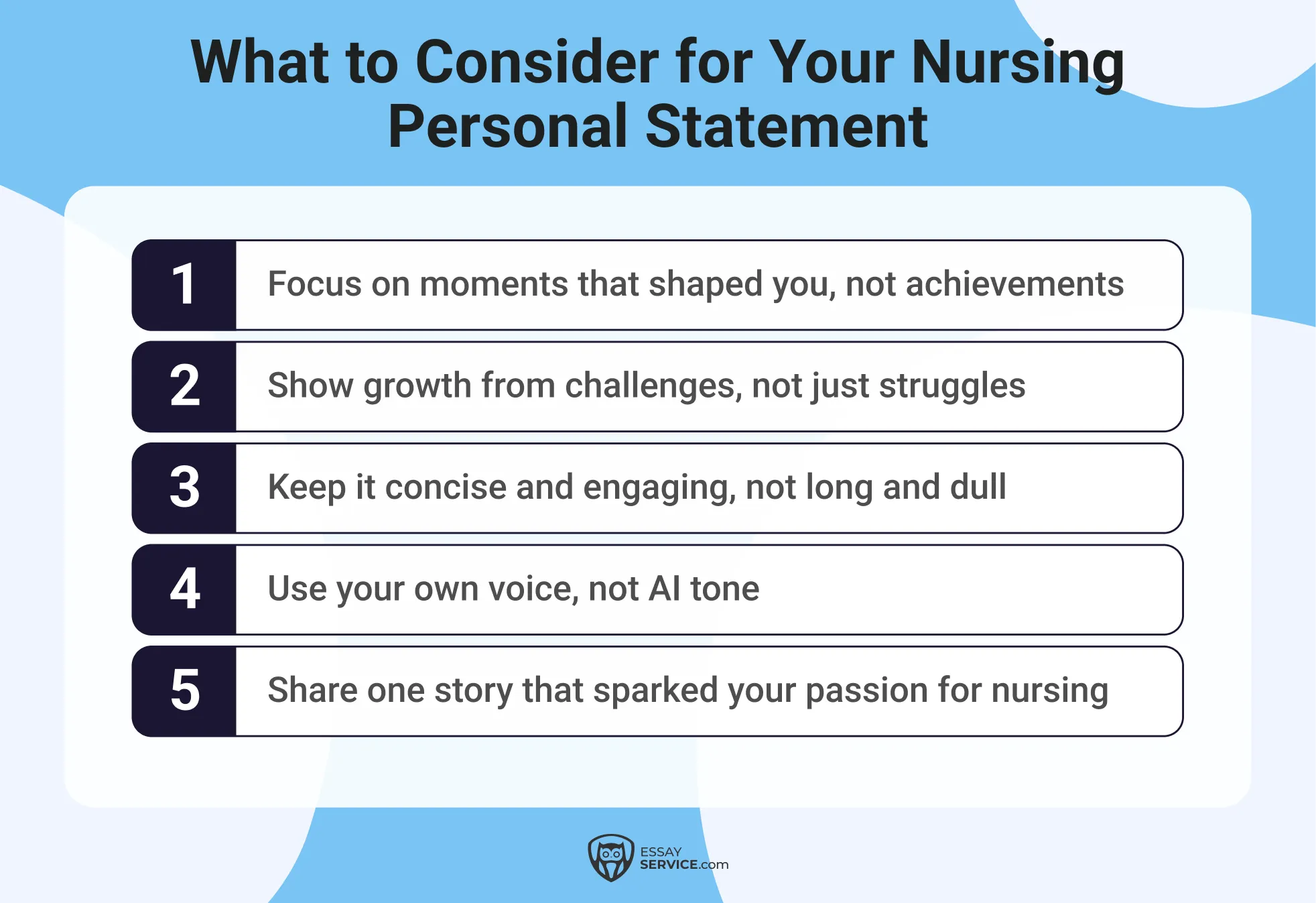A compelling personal statement for nursing school is a short essay that explains why you want to become a nurse and what makes you a strong candidate for the program. It gives the admissions committee a sense of your motivation and the qualities you’ll bring to patient care.
If writing personal statement for nursing school feels difficult, our essay writing service can help you find your voice. You can team up with one of our authors and let them guide you through personal statements so your story comes through clearly.
What Is a Nursing School Personal Statement?
A personal statement for nursing school is typically a short essay, about a page long, where you discuss your background, experiences, and goals in nursing. It is your opportunity to help admissions officers learn more about you other than your grades and test scores. Every school requires something different, so it's important to know what is asked of you in your statement. Why you think you'd be a good fit for their specific nursing program and what you like about nursing are common questions to answer in your statement.

What to Include in a Personal Statement for Nursing School?
A report from the AACN showed that about 72% of employers prefer nurses with a bachelor’s degree, a reminder of how much education shapes opportunity in this field.
When you start writing a personal statement for a nursing program, think about what first pulled you toward nursing and what moments confirmed that pull. Maybe it wasn’t one big event, but a handful of smaller ones, like a class, a volunteer shift, a quiet conversation that stuck with you.
In the next sections, we’ll walk through what belongs in your statement and how to make every line feel true to you.
Your Future Goals
Each personal statement needs an intent, because you are not simply applying anywhere; you are applying to the right place for you. Mention specific courses, training opportunities, or values that make this nursing program the right choice. Then explain your career goals clearly. Whether you aim to work in community health or specialize in critical care, define it simply and directly
If you’re still figuring out your direction, our guide on good reasons to become a nurse might help you think it through. Sometimes understanding why this field matters, to you and to others, is where the best writing begins.
Academic Background
Begin by detailing:
- Academic achievements;
- Relevant coursework.
Outline your educational experiences and training as important elements of your aspiration to become a nurse. For example, you might recall the challenging science classes you completed in high school, your healthcare electives in college, etc.
Relevant Skills
You don’t need to list every skill like you’re checking boxes. For example, explain how you practiced attention to detail while monitoring vital signs during clinical training or how you used communication skills to calm an anxious patient. Mention teamwork, time management, and adaptability, since nursing often means responding quickly to changing conditions.
Focus on experiences that prove you can handle responsibility and care for others with patience and accuracy. If you ever feel stuck mid-sentence, go read a few nursing quotes; they might remind you what first drew you here.
Volunteer Experience
Articulate your enthusiasm for the nursing program you're applying to by highlighting its unique attributes. Delve into aspects of the curriculum, faculty expertise, or clinical opportunities that resonate with your career goals. For instance, you might express your eagerness to participate in the program's community health initiatives or emphasize your desire to gain hands-on experience in diverse clinical settings.
Program Motivation
In this part of your personal statement, you show a personal connection to the information you are sharing. When an admissions officer reads your essay, they should feel like you have already placed yourself as part of the school where you engage, grow, and become the kind of nurse that this program is designed to educate and prepare.
Personal Motivation
Conclude by sharing personal anecdotes or challenges that have fueled your passion for nursing. Offer a glimpse into the pivotal moments that have shaped your journey and solidified your commitment to the profession. Perhaps you could recount how caring for a family member with a chronic illness ignited your desire to make a difference in the lives of others, underscoring the profound impact of empathy and resilience in your decision to pursue nursing.
How Long Should a Nursing Personal Statement Be?
Most essays follow a simple structure with a beginning, middle, and end.
- Introduction (10-15%): Start with something direct, such as a short personal story or a specific reason you chose nursing. For example, describe a time you helped a family member through illness or saw a nurse’s impact firsthand.
- Body (70%): Use this section to connect your experiences with the skills required in nursing. Mention volunteer work, hospital internships, or community service that built your empathy, teamwork, and communication abilities. Include examples that show technical competence, such as recording patient data accurately or responding calmly in emergencies.
- Conclusion (15-20%): Don’t overthink the ending. End by summarizing your long-term goals and values. You might write about your interest in public health, patient education, or specialized care. Show a clear commitment to professional growth and to serving patients.
If you’re wondering how long should a personal statement be for nursing school, most fall somewhere between 500 and 800 words. The rest is tone. Be clear and warm. Don’t sound like you memorized what you were ‘supposed’ to write.
How to Write a Personal Statement for Nursing School?
Below, our personal statement writing service offers a handful of straightforward tips to simplify writing a nursing school personal statement. By incorporating these practical pointers, you'll find yourself well-equipped to create an outstanding nursing school essay that authentically reflects your unique qualities and aspirations.
Create a Writing Timeline
Don't procrastinate on your nursing school personal statement and make sure you schedule deadlines for each stage of the writing process. Your tasks should be broken into smaller 'chunks' that you can accomplish in an adequate time period: gathering materials and details, writing, getting feedback from family and friends, and polishing your final statement. It's essential to organize each step in a structured timeline to write with more effectively.
Follow Every Guideline
Review the nursing school's instructions thoroughly and make note of any specific prompts or requirements they provide. Pay attention to word limits, formatting guidelines, and any additional materials they request, ensuring your personal statement aligns perfectly with their expectations. Consider creating an outline or checklist based on the guidelines to ensure you cover all necessary aspects in your statement.
Write With Heart
In your nursing personal statement, don't hesitate to write about your lived experiences, passions, and ambitions. Be true to yourself and let your emotions come through in your writing, as well as to express your enthusiasm for nursing, and ultimately place the reader in your frame of mind. Rather than using general remarks and clichés share stories or experiences that point to your desire to become a nurse and demonstrate your commitment and engagement. Again, beware of well-worn phrases or statements but write what is unique to you that will stand out to the reader.
Research the Program
Take the time to research the particular nursing program and school you're applying to and consider how your own values and goals align with those of the institution. Then, tailor your own personal statement to show your genuine interest.
Research the nursing school application and any specific criteria or qualities they look for in applicants to address these effectively in your statement. Personalize your statement by incorporating references to the school's mission, values, or programs.
Proofread Before You Submit
Don’t rush to submit once you’re done crafting personal statement for nursing school. Take a pause, then come back with fresh eyes and read it like you’re seeing it for the first time. Does it sound honest and flow well?
Reading out loud is the simplest trick that works every time. You’ll spot stiff sentences and hear the rhythm of your thoughts more easily. That way, you’ll finally know if your voice really sounds like you.
Ask for Feedback
You’ve read your personal statement so many times that it starts to blur. That’s when you can ask someone you trust, like a mentor or a friend, to read it too, and make sure they tell you the truth while preparing yourself for critique. Ask them what stuck with them, what felt real, and what felt rushed. One comment can change how the whole piece reads.
Template for a Nursing School Personal Statement
To guide you through the process, here's a nursing school personal statement template.
[Introduction]
Start with a real moment from your life that sparked your interest in nursing. Keep it personal and real.
[Motivation]
Talk about what that moment taught you. Explain what made you want to build a career around helping others.
[Why This Program]
Share why you’re drawn to this particular nursing school. Mention something specific, like hands-on training or community involvement.
[Experience and Skills]
Describe the experiences that helped you grow. Focus on what you learned, like communicating under pressure or working well with a team.
[Future Goals]
Write about where you hope your nursing career will take you. Show that you’ve thought ahead.
[Conclusion]
Wrap it up by restating your passion for nursing and your excitement to start this new chapter. Conclude with a confident, warm tone that feels authentic to you.
Personal Statement for Nursing School Examples
Let's examine an actual example from the real world that includes professional aspirations, academic achievements, and personal experiences to create a compelling narrative that shows the candidate's passion for nursing. You can change these nursing personal statement examples to apply to your vision and experience.
*Important note: Please do not submit an application using our samples. These nursing personal statement examples are intended to be used as a model for creating your own unique story.
Things You Should Not Include When Writing A Personal Statement for Nursing School
Everyone wants their personal statement for nursing school to be perfect, but being perfect is often where they go wrong.
Some things to avoid while writing a personal statement for nursing school:

- Do not make it a resume. You already have one. This is your space to reflect on tangible moments that changed your life.
- If you talk about struggles, don't let that be the end of the story. What happened after that? How did you change? How did you think or act differently?
- Do not make it too long to be unmanageable. A page and a half that obviously comes from your heart and has a pulse is better than three pages that lose the flavor halfway through.
- Avoid falling into the trap of using a template or AI tools. Templates might work for other writing formats, but be cautious. While these may sound smooth, often that smoothness feels soulless.
- Make it specific. Do not just say 'I love helping people,' but rather say who you helped, when you helped them, and how you did that. Describe one specific moment that made you think: 'This is where I’m meant to be.'
Final Thoughts
A personal statement for nursing school shows why you want to become a nurse and what makes you ready for the program. It’s your chance to share your story, say what inspired you, what you’ve learned, and how your experiences shaped your goals.
And if you are writing a personal statement for nursing school and would like support in expressing a personal narrative, EssayService can help. Our authors make sure your voice stays authentic while your message comes through clearly.
Frequently Asked Questions
Do All Nursing Schools Require A Personal Statement?
Not all nursing schools necessitate a personal statement, but many do. It serves as a means for you to express your passion for nursing and showcase your unique qualities that make you a good fit for the program. While some schools may prioritize standardized test scores and GPA, a well-crafted personal statement can make you stand out and give the admissions committee a deeper understanding of who you are beyond your academic achievements.
When to Write a Personal Statement for Nursing School?
It's best to write your personal statement for nursing school when you have a clear understanding of your motivations, experiences, and career goals in nursing. This might be during your final year of high school if you're applying to undergraduate programs or when you've gained some relevant experience if you're applying to graduate programs. Take the time to reflect on why you want to pursue nursing, any relevant experiences you've had, and how those experiences have shaped your desire to become a nurse.
How Long Does a Personal Statement Have to Be for Nursing School?
A personal statement for nursing school is usually between 500 and 800 words. Some programs might set their own limits, so always check the specific guidelines before you begin. Keep it focused, organized, and personal, yet concise enough to tell your story without losing engagement.
What Is a Good Opening Line for a Nursing Personal Statement?
A strong opening line should feel genuine and specific. You could start with a brief story, a memory, or a moment that sparked your interest in nursing. For example, ‘I realized how powerful compassion can be the day I helped calm a frightened patient during my volunteer shift.’
What Should I Include in My Nursing School Personal Statement?
Your nursing school personal statement should include things like what drew you to nursing, your academic background, relevant skills, and experiences that led you to become interested in the program and in patient care. Mention qualities like empathy, communication, and teamwork, and connect your goals to the program you’re applying for. End with a short reflection on how you hope to grow in your nursing career.

Susan shapes the new generation of nursing professionals as a professor. Her medical degree and teaching experience make for a wealth of advice on researching and writing complex papers.
- University of Central Lancashire. (n.d.). How to write a nursing personal statement. Retrieved from https://www.lancashire.ac.uk/articles/advice/how-to-write-a-nursing-personal-statement
- Royal College of Nursing. (n.d.). Sample supporting statements. Retrieved from https://www.rcn.org.uk/Professional-Development/Your-career/Sample-Supporting-Statements
- Leeds Trinity University. (n.d.). Nursing personal statements. https://www.leedstrinity.ac.uk/undergraduate/nursing-personal-statements/
New posts to your inbox
Your submission has been received!




